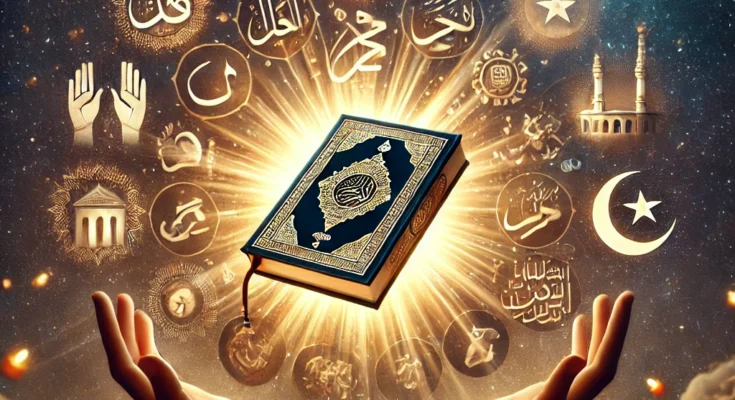Every Muslim must comprehend the fundamental ideas and tenets of Islam. Whether you are a recent convert or a believer seeking to grow in your religion, knowing the answers to important Islamic questions will improve your understanding of Islam and your relationship with Allah. This essay will discuss ten fundamental truths that all believers should be aware of and will also discuss the important role that Sirat un Nabi—the Prophet Muhammad’s, peace be upon him—plays in helping readers comprehend and provide answers to these issues.
Table of Contents
ToggleWhat Is the Importance of Belief in Allah?
Islam is based on the conviction that there is only one genuine God, Allah. The core of the Sirat un Nabi and the first of the five pillars of Islam is this belief. When we examine the life of the Prophet Muhammad (PBUH), we witness his total surrender to the commands and will of Allah.
Sirat un Nabi aids in our understanding of the significance of this conviction. Prophet Muhammad (PBUH) taught that everything in the cosmos is Allah’s, and he constantly emphasized Tawhid, or the oneness of Allah. A Muslim’s belief in Allah is a deep and sincere acceptance that guides all of their actions. It is not merely an academic acknowledgement.
Why Is the Prophet Muhammad (PBUH) the Final Messenger?
The reason why Prophet Muhammad (PBUH) is regarded as the last messenger is one of the most commonly questioned Islamic questions. The significance of Sirat un Nabi and his function in conveying the last revelation, the Quran, hold the key to the solution.
The Prophet’s mission, hardships, personality, and unshakable commitment to advancing the Islamic message are all described in depth in Sirat un Nabi. As Muhammad was selected by Allah to convey the final and comprehensive word for all of humanity, the finality of his prophethood is a fundamental component of the Islamic religion.
What Is the Purpose of Life According to Islam?
The meaning of life is among the most serious questions in Islam. The answers are evident in Sirat un Nabi and the Quran. Islam teaches that life is a test, and that we should adore Allah, keep His commands, and lead moral lives. It is incumbent of every believer to prepare for the Hereafter by striving for virtue in this life.
The Prophet Muhammad (PBUH) lived a life of purpose and dedication, teaching Muslims how to face life’s challenges, as revealed in the Sirat un Nabi.
What Are the Five Pillars of Islam?
The five pillars of Islam must be upheld by every Muslim. The Hajj (the journey to Mecca), Salah (prayer), Zakat (charity), Sawm (fasting), and Shahada (the declaration of faith) are some of these pillars. Each of these pillars is exemplified by the teachings and actions of the Prophet Muhammad (PBUH), according to Sirat un Nabi.
By following these guidelines, Muslims can maintain their Islamic way of life and strengthen their relationship with Allah. The Prophet’s life demonstrates his steadfast adherence to these traditions and his constant call on Muslims to do the same.
How Does Sirat un Nabi Guide Islamic Law?
The Sirat un Nabi primarily governs Shariah, or Islamic law. Numerous problems concerning the rights and responsibilities of Muslims can be addressed by looking into the Prophet’s biography. His actions, words, and decisions provide an example for how Muslims should conduct themselves in relation to morals, worship, and interpersonal relationships.
As a moral compass for believers, Sirat un Nabi, for instance, clarifies how Prophet Muhammad (PBUH) addressed concerns of justice, equality, and social welfare.
What Does Islam Say About Good and Evil?
Regarding the concepts of good and evil, Islam provides clear guidance. According to the teachings of the Quran and Sirat un Nabi, everything that obeys Allah’s instructions is good, while anything that does not is bad. The Prophet Muhammad (PBUH) taught Muslims to fight injustice, refrain from immoral conduct, and aim for virtue in whatever they do.
His unwavering commitment to morality and emphasis on maintaining moral standards in all areas of life are seen in the Prophet’s biography.

What Happens After Death?
The question of what happens after death is one of the most common and significant Islamic questions. Islam teaches that after death, every soul will face judgment by Allah. The deeds performed in this life determine one’s fate in the Hereafter, either leading to Paradise or Hell.
Sirat un Nabi reveals many accounts where Prophet Muhammad (PBUH) reminded his followers of the reality of the Hereafter and the importance of living a life that pleases Allah. His life serves as a model for preparing for this inevitable journey.
Why Is Charity So Important in Islam?
One of the five pillars of Islam and a key component of Sirat un Nabi is charity, or zakat. Muslims have a duty to assist people in need, which improves ties throughout the society and lessens social injustice.
The Prophet (PBUH) established an example for his people to follow by actively participating in charity endeavours and encouraging generosity, as seen in several occasions in Sirat un Nabi.
How Does Sirat un Nabi Shape Our Understanding of Jihad?
Sirat un Nabi offers important insights into the genuine meaning of jihad, which is frequently misinterpreted. Fundamentally, jihad is the pursuit of a righteous cause. It can be used to defend Islam, but it also refers to individual battles for morality and spiritual development.
According to Sirat un Nabi, the life of the Prophet Muhammad (PBUH) illustrates Jihad as a nonviolent fight for the betterment of oneself and society by giving, compassion, and resistance to injustice.
What Is the Role of Women in Islam?
There is a lot of discussion over the place of women in Islam. Nonetheless, it is evident from the Quran and Sirat un Nabi that women are valued and cherished. By highlighting female rights in areas like education, inheritance, and social engagement, Prophet Muhammad (PBUH) improved the position of women.
The Prophet treated women with the utmost respect and made sure they had equal opportunity to contribute to society, according to Sirat un Nabi.
Conclusion
Every believer must comprehend Islamic questions and answers, and the Sirat un Nabi offers the finest direction for doing so. Muslims can strengthen their faith and gain clarity on important Islamic concepts by considering the life of the Prophet Muhammad (PBUH).
Every Muslim who wants to learn more about Islam must adhere to the 10 fundamental principles listed above, all of which have their roots in Sirat un Nabi’s teachings. These facts, which range from the significance of believing in Allah to the place of women, demonstrate the all-encompassing and well-rounded perspective that Islam provides its adherents.

FAQ,s
Q1: What is the importance of belief in Allah in Islam?
A: Belief in Allah is the foundation of Islam. It signifies the oneness of God (Tawhid), where Muslims affirm that there is no god but Allah, and He is the Creator, Sustainer, and Judge of the universe. This belief forms the core of Islamic teachings.
Q2: Why is Prophet Muhammad (PBUH) considered the final messenger?
A: Prophet Muhammad (PBUH) is considered the final messenger because he brought the last and complete message, the Quran, which is the eternal guidance for humanity. His life, known as Sirat un Nabi, provides a perfect example for Muslims to follow.
Q3: What are the Five Pillars of Islam, and why are they important?
A: The Five Pillars of Islam are:
- Shahada (Declaration of faith)
- Salah (Prayer)
- Zakat (Charity)
- Sawm (Fasting during Ramadan)
- Hajj (Pilgrimage to Mecca)
These pillars form the foundation of a Muslim’s worship and commitment to Allah and His commands.
Q4: What is the significance of Sirat un Nabi in Islam?
A: Sirat un Nabi refers to the life and teachings of Prophet Muhammad (PBUH). It is significant because it provides practical examples of how Muslims should live according to Islamic principles. It helps answer many questions about Islamic values, laws, and practices.
Q5: How does Islam define the purpose of life?
A: In Islam, the purpose of life is to worship Allah, follow His guidance, and prepare for the Hereafter. Life is seen as a test where actions and intentions will be judged by Allah on the Day of Judgment.
Q6: What happens after death according to Islam?
A: Islam teaches that after death, the soul enters a waiting period called Barzakh until the Day of Judgment. On this day, every person will be judged based on their deeds, and they will be rewarded with either Paradise or punished in Hell, based on their actions in this world.
Q7: What is Zakat, and why is charity so important in Islam?
A: Zakat is a mandatory act of charity that requires Muslims to give a portion of their wealth to those in need. Charity is important in Islam because it purifies wealth, supports the less fortunate, and strengthens community bonds.
Q8: What does Islam say about good and evil?
A: Islam teaches that good is anything that aligns with Allah’s commandments and leads to righteousness, while evil is anything that contradicts His laws and leads to sin. Muslims are encouraged to promote good and prevent evil in their lives and society.
Q9: What role does Sirat un Nabi play in Islamic law (Shariah)?
A: Sirat un Nabi provides practical examples of how Prophet Muhammad (PBUH) applied the teachings of the Quran in real-life situations. It serves as a guide for Islamic law (Shariah) and helps Muslims understand how to apply religious principles in their daily lives.
Q10: What is the role of women in Islam according to Sirat un Nabi?
A: Sirat un Nabi highlights the significant role of women in Islam. Women are given rights in education, inheritance, and participation in social life. Prophet Muhammad (PBUH) treated women with respect and dignity, promoting their rights and emphasizing their important role in society




